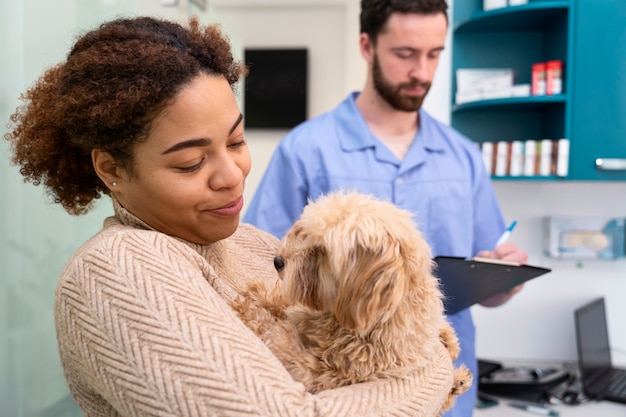Recognizing Breathing Difficulties in Pets: When to Get Urgent Help

Recognizing Breathing Difficulties in Pets: When to Get Urgent Help
When your dog or cat starts breathing noisily, rapidly, or seems to be struggling for air, it can be frightening and confusing. Is this a true emergency, or something that can wait until your regular vet opens? At VetCheck Pet Urgent Care Center - Carmel, we know how alarming it is to see your beloved pet gasping, coughing, or showing signs of distress. Our dedicated veterinary team provides immediate, walk-in care for breathing difficulties in pets at our conveniently located clinic at 1374 South Rangeline Road, Carmel, IN 46032. In this guide, we’ll explain how to recognize when abnormal breathing means a pet respiratory emergency, why these symptoms happen, and what you should do to keep your pet safe on the way to an emergency vet near you. Remember, no appointment is needed at VetCheck—walk-ins are always welcome, especially for urgent pet care needs.
Throughout this blog, you’ll learn the most common signs of respiratory distress in dogs and cats, possible causes, what our veterinary professionals can do to help, and how you can support your pet before and during your visit. If you’re searching for urgent care vet near me because your pet is struggling to breathe, know that help is close by in Carmel and surrounding communities. For more information on our emergency services, visit our page about emergency veterinary care available right here at VetCheck Pet Urgent Care Center.
Understanding Breathing Difficulties in Pets: How to Spot the Signs
Breathing difficulties in pets can present suddenly or develop gradually, and even subtle changes can signal a serious health problem. Recognizing the early warning signs is crucial for timely intervention. Dogs and cats may show distress in different ways, so it helps to be familiar with the signs that something is wrong.
Key symptoms of respiratory distress include rapid breathing, noisy breaths such as wheezing or snorting, labored or heavy breathing where each breath looks like a struggle, and open-mouth breathing in cats. Other warning signs are excessive panting that doesn’t resolve with rest, blue or pale gums or tongue, flared nostrils, and coughing that persists or is accompanied by choking sounds. Some pets may extend their necks, assume a sitting or stretched-out position to try to breathe better, or become lethargic and collapse.
Owners in Carmel and the surrounding areas often notice these symptoms when their pet seems overly tired after minimal activity, starts breathing abnormally at rest, or has trouble catching their breath after coughing or vomiting. If your pet is showing any of these signs, especially if they worsen quickly, it’s important to seek emergency veterinary care immediately. For detailed information on coughing and upper respiratory issues in pets, our page on upper respiratory (coughing) issues can offer additional guidance.
What Causes Pet Respiratory Emergency Situations?
Breathing difficulties in pets can have many underlying causes, ranging from mild irritations to life-threatening emergencies. Knowing the potential reasons behind these symptoms can help you understand the urgency of the situation.
Common causes of respiratory distress include infections such as kennel cough, feline upper respiratory infections, or pneumonia, as well as allergic reactions that lead to swelling in the throat or airways. Foreign objects stuck in the throat, such as bones, toys, or grass awns, are another frequent cause of sudden breathing problems. Other triggers involve heart disease, fluid buildup around the lungs, trauma to the chest, or complications from underlying chronic conditions like asthma or collapsing trachea.
Certain breeds—especially brachycephalic (short-nosed) dogs and cats such as Bulldogs, Pugs, and Persians—are more prone to airway obstructions due to their unique anatomy. Exposure to toxins, smoke, or extreme heat can also result in rapid onset of respiratory distress. In Carmel, where seasonal allergies and temperature swings are common, allergic airway reactions and heat stress can be especially concerning for pets during the spring and summer months.
In some cases, vomiting and subsequent aspiration of stomach contents can cause severe inflammation or infection in the lungs, leading to acute breathing problems. If your pet has recently been vomiting, has a history of heart or lung disease, or has come into contact with any potential toxins, these details are important to share with your veterinary team during your urgent visit.
How Emergency Vets Diagnose and Treat Breathing Difficulties in Pets
Once you arrive at VetCheck Pet Urgent Care Center - Carmel, our veterinary professionals move quickly to stabilize your pet and determine the underlying cause of their breathing difficulty. Immediate steps often involve providing supplemental oxygen, minimizing stress, and assessing airway patency.
Diagnosis involves a thorough physical examination, listening to your pet’s chest and lungs, and using advanced in-house diagnostic tools. These may include chest X-rays, blood tests, and oxygen saturation measurements. Our team is equipped to perform in-house diagnostics for urgent cases, allowing us to rapidly identify issues such as fluid around the heart or lungs, tumors, or foreign bodies.
Treatment approaches depend on the cause and severity of the respiratory emergency. For airway obstructions, your veterinarian may need to remove the object or perform emergency procedures. Infections are managed with appropriate medications, while allergic reactions may require fast-acting injections to reduce swelling and open airways. Pets with heart failure or fluid accumulation may receive diuretics or other medications to support lung function. In severe cases, hospitalization and continuous oxygen therapy in our Carmel facility may be necessary to stabilize your pet.
Throughout the process, our veterinary team keeps you informed and involved, explaining each step and focusing on your pet’s comfort and safety. We understand that emergencies happen outside of normal hours, which is why we are here when your regular vet isn’t—no appointment needed.
What You Can Do at Home and On the Way to the Vet
When your pet is experiencing labored breathing, every moment counts. The first priority is to remain calm and avoid actions that could worsen their distress. Steps you can take include moving your pet to a cool, quiet area away from other pets or loud noises, and minimizing physical handling unless absolutely necessary. If your pet appears to be choking, do not attempt to remove a foreign object unless it is clearly visible and easily accessible, as untrained efforts can cause further injury.
Never offer food, water, or oral medications to a pet that is struggling to breathe. For pets with a history of chronic respiratory or heart issues, gather any relevant medications or medical records to bring with you to the urgent care clinic. If possible, call ahead to let the veterinary team know you are en route, but do not delay your departure.
During transit to VetCheck Pet Urgent Care Center, keep your pet in a well-ventilated carrier or securely restrained, as excessive movement or stress can worsen their symptoms. For cats, a covered carrier can offer a sense of security. In dogs, allowing them to sit or stand with their head extended may help ease breathing. If your pet collapses or stops breathing, immediate veterinary intervention is critical—our team is prepared for these life-threatening emergencies.
When to Seek Emergency Veterinary Care in Carmel
It can be difficult to determine exactly when to seek help, but certain signs always warrant a trip to an urgent care vet near you. You should bring your pet for immediate evaluation if they are breathing rapidly and with effort, have blue or pale gums, collapse, or appear unable to catch their breath. Persistent coughing that leads to weakness, choking sounds, or visible swelling of the face or throat also indicate a pet respiratory emergency.
Additionally, if your pet has inhaled smoke, been exposed to toxins, or has a known heart or lung condition with new or worsening breathing problems, do not wait for symptoms to resolve on their own. In Carmel and surrounding communities, our veterinary professionals are ready to provide prompt care whenever you need us. For more information on our approach to emergency and urgent care, you can explore our dedicated service page.
Remember, breathing difficulties in pets can deteriorate rapidly, especially in vulnerable breeds, very young or old animals, or those with chronic health issues. Early intervention can make all the difference—don’t hesitate to seek help, even if you are unsure of the severity.
Take Action: Your Pet’s Breathing Emergency Deserves Immediate Attention
Seeing your pet struggle to breathe is one of the most distressing experiences a pet owner can face. At VetCheck Pet Urgent Care Center - Carmel, we are committed to providing fast, compassionate care for breathing difficulties in pets, day or night. Walk-ins are always welcome, and our doors are open when your regular veterinarian is unavailable. Our experienced veterinary team offers advanced in-house diagnostics, emergency oxygen support, and life-saving treatments for pet respiratory emergencies in Carmel.
If you ever find yourself searching for an emergency veterinarian near me because your pet is showing signs of distress, remember that help is just around the corner at our Carmel location. For additional information on our immediate care capabilities, visit our emergency veterinary care page or learn how our in-house diagnostics support rapid answers when seconds count.
If your pet is experiencing breathing difficulties in Carmel or nearby areas, do not wait. Call us at (317) 516-0707 or come directly to our clinic—no appointment necessary. Your pet’s safety is our top priority, and our team is here to guide you through every urgent situation with expertise and compassion.
Remember: This article is for informational purposes only and should not replace professional veterinary advice. If your pet is in distress, seek emergency care immediately.



















